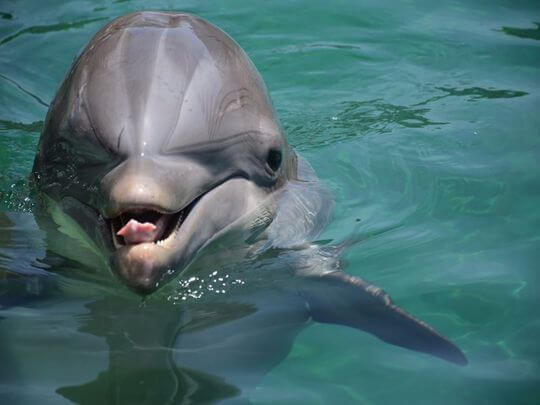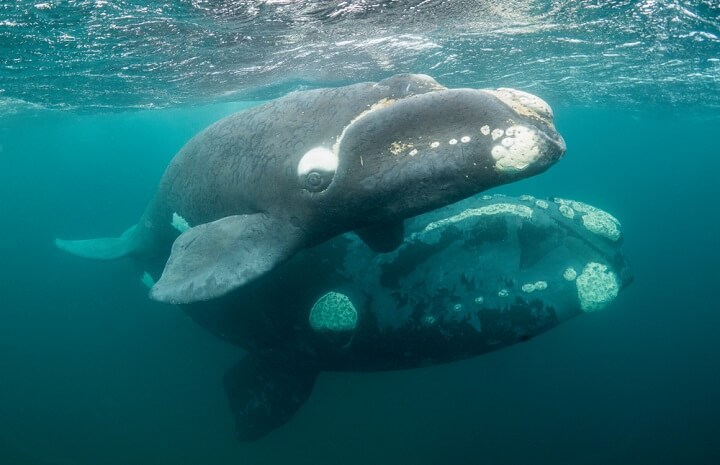Tom White is a philosopher with considerable experience observing dolphins in the wild. He says that it’s not until you’re out on the ocean watching them flourishing in the wild that you can truly understand who they are and what it means for them to flourish.
The concept of flourishing is key to understanding the argument for recognizing that dolphins and whales have clear and inalienable rights.
Tom was the guest of Dr. Lori Marino, President of the Whale Sanctuary Project, in a webinar on September 1st, 2022.
Below is a transcript of Dr. White’s comments, edited for length.
Lori Marino: In your experience, Tom, what’s the difference between seeing dolphins in captivity and seeing them in their natural habitat?

Thomas I. White, Ph.D.
Tom White: The difference is enormous. The best simple phrase I’ve heard is from scientist Denise Herzing, who says a dolphin in captivity is “a shadow of a dolphin.” And when you first experience what they’re like in their natural environment, it’s a huge difference. It’s a reminder that any animal (including us humans) is the way they are because of an evolutionary history and how they have progressed over time and have adapted to an environment to be able to survive and to lead a full life.
Flourishing is simply a shorthand way of talking about this. When we talk about the conditions necessary for flourishing, we’re talking about the conditions necessary for a being, given its evolutionary history, to be able to have even a rudimentary opportunity for a successful life as the member of that species.
The notion of a “right” is simply a shorthand way of referring to conditions that are necessary for beings to thrive and flourish.There’s no way that dolphins in a tank can live a full, satisfied life because that’s not where they evolved. In the same way, the kinds of conditions that we humans need in order to grow, to develop and to have some sense of satisfaction in life is all defined by our evolutionary history. And this is a way of talking about ethics that gives it a biological foundation.
Speaking very practically, if an action advances the likelihood that members of our species are going to be able to have a fuller and satisfying life, that’s a long way of saying something is right. And if an action is going to get in the way of your being able to flourish, then it’s wrong. The notion of a “right” is simply a shorthand way of referring to conditions that are necessary for beings to thrive and flourish.
The point here is that this takes us out of the realm of opinion. People like to say that ethics is a matter of opinion most of the time. No, it’s not. We can define and identify the conditions that have to be met under which human beings grow and develop emotionally and intellectually in order to flourish, to have a full and satisfying life, and to have an opportunity to be successful as a member of that species. And that’s all empirical.
LM: Is it the case that animals can never flourish in a situation to which they are not adapted?
TW: When you talk about adaptation, think of the amount of time it takes for adaptation to take place. Every now and then people will ask whether a dolphin can adapt to captivity and how long it might take. And my answer is maybe a million years, maybe just a hundred thousand years. Evolution moves slowly. Think of all the ways in which humans still possess traits that were once adaptive but are now maladaptive. One of my favorite examples is diet. We evolved in a way to like stuff that was scarce at a certain time, but that we can have all the time now. So, now it’s maladaptive to have fat and sugar as central parts of our diet. Adaptation moves really slowly.
LM: People sometimes argue that when dolphins are born in captivity, they are adapted to captivity. But the science tells us that they do just as poorly, if not worse, than those who were captured from the wild. There’s no such thing as a domesticated dolphin. These animals are not adapted to living in captivity. They don’t live very long. Their quality of life is very poor. And what they suffer in terms of behavioral disorders etc. all points to the simple fact that this is not an environment that allows them to thrive or flourish.
TW: We’re talking about beings with self-awareness and self-consciousness. They’re individuals. And individuals count. It isn’t just populations. It isn’t groups. It’s individuals.

Bodie at Dolphinaris, a failed swim-with-dolphins facility in Scottsdale, AZ.
This is really important. It relates to when people say, for example, that dolphins live reasonably long in captivity. Now it’s true that dolphins, in some ways can adjust to bad circumstances in the same way that human beings can adjust to bad circumstances. It’s true that human beings can adapt to servitude for a while, but one of the things that human beings have evolved to like is individuality and making choices.
That’s why we always make a big deal about freedom. And the need for freedom and individuality is such a deep need that eventually people in servitude get so angry that they will revolt. They will put their lives on the line to get this need. They can adjust for a certain amount of time, in some cases even for their whole life. And they can adjust to poor conditions. But just because they are adjusting to poor conditions doesn’t mean that it’s consistent with the kinds of needs that have to be met in order to grow and develop. And exactly the same thing is true of cetaceans.
LM: At a meeting that you and I attended in Helsinki that was hosted in 2010 by Whale & Dolphin Conservation, the group established a Declaration of Rights for cetaceans. Five of those rights are:
- The right to life and bodily integrity – not to be subjected to invasive treatment of any kind;
- The right to bodily freedom within your natural environment – not to be subjected to captivity or servitude
- The right not to be owned – not to be the property of any human individual, group, state or corporation;
- The right to protection of your natural environment;
- The right to protection of your culture.
TW: When we talk about their rights, we’re really just talking about anything related to the fact that dolphins are individuals. They are self-aware with the kind of sophisticated intellectual and emotional capacities that have them being autonomous. They make their own decisions. They make choices in the same way that human beings do.
But let’s skip down to Number Five on your list, the issue of culture, because that becomes extremely important when you’re talking about beings like dolphins. The point of culture is to transmit information. Culture gives us a sense of belonging, a sense of community. And most importantly from an evolutionary standpoint, culture transmits information from one generation to another about how to survive.
When we talk about flourishing, it’s about how, as an advanced, sophisticated being in a particular environment, do you manage to stay alive? How do you manage to function in your group? How do you make it possible for your children to survive and for your species to continue?
Culture transmits information from one generation to another about how to survive.Well, one of the most important ways is through information that can be transmitted from one generation to another. With humans, we do a lot of that through books. And that depends on the kind of human language that we have.
Dolphins have their own way of transmitting information. Hal Whitehead has documented the fact that one of the consequences of whaling was that an area of the Atlantic got so wiped out that the whales who carried the information about how to survive were hunted to the point where the information never got passed on about how to live successfully in that part of the ocean. That means when you talk about whales being killed, you have to appreciate the fact that part of the ethical significance of this is that you also kill off the ability for the information to be transferred.
So, we’re talking about generational consequences, long term consequences. And one of the things people have sort of resisted is the notion of the culture of cetaceans. People get okay with understanding personhood. “I can understand health and safety and emotional wellbeing. I can understand family. But culture? Isn’t that kind of just a nice add-on?”
No, culture is absolutely central. So, one of the most significant things of the document we put together in Helsinki was to appreciate that one of the long-term consequences of human behavior toward whales is the question of the harm we can’t undo because we didn’t know we were doing it.
And from an ethical standpoint, if you do that kind of harm, don’t you have some responsibility to try to try to make it right? In the past, we had this bias that we were the only complicated animals on the planet. But it’s just not the case. And that’s the kind of work that scientists like Hal Whitehead and Luke Rendell are doing to recognize the significance of culture and the complexity of other beings and the kind of harm that goes with depriving beings of that kind – individuals and groups – of the conditions that they need, not just for them to survive now, but for their children and grandchildren to survive.

Dolphins surfing, by David O’Brien via Shutterstock.
LM: And then there’s the issue of what we’re doing to the planet. Climate change is making it pretty impossible for generations, human or non-human, to flourish in the future. Traditional conservation is just not enough – this notion of numbers. You can’t just wave off the problem by saying that these animals are plentiful around the world. That’s not the issue. Orcas in the Pacific Northwest are a different culture from those off New Zealand or Iceland. The bottlenose dolphins off the coast of Florida are a different culture from those off the coast of Australia.
It’s not enough just to count the numbers. If you wipe out a particular community of dolphins or whales, it’s cultural genocide. You’re wiping out an entire culture that can never come back.
TW: So, from an ethical standpoint, we need to talk about the conditions that beings of this sort need in order to grow, develop and have healthy, happy, satisfying lives, or at least an opportunity for that. We need to identify those conditions. And we need to ask how do we prevent harm from happening? How do we prevent harm from continuing in the future?

Group of southern right whales with mother protecting calves. Nullarbor, Australia. By Wildestanimal via Shutterstock.
It’s not a matter of how many are there out there. You wouldn’t say that about humans. You wouldn’t argue that we have plenty of humans. And the reason we don’t say that is that we have this attitude that we’re “different”. And in certain ways that’s true. We’re special in certain ways, as all beings are. We’re unique in the sense of being human, but we aren’t unique in having individual consciousness and the ability to control our actions.
An argument can be made that cetaceans have a kind of intelligence that’s different from ours and that in some ways they are more intelligent than humans.
LM: What kind of intelligence would that be? How do you define intelligence?
In some ways they are more intelligent than humans.TW: My definition of intelligence starts with: Can you identify problems that are threats to your survival? And can you provide solutions that make it more likely you’re going to survive?
When you look at our behavior as humans, you’re looking at global warming, trashing our own environment, overpopulating, killing one another on such a regular basis. And then you look at whales and dolphins. They’ve been around a whole lot longer than we have, so we don’t know what they did in their history. But you’re looking at a species that came up with solutions to their problems and threats. And looking at human behavior, you’d have to say we’re not doing that. We’re just exploding the planet.
LM: That’s not intelligent and it gets to the question of the changes that we’ve made by being such an invasive force on the planet. What are some of the elements of cetacean culture that are particularly affected by human activity?
TW: Communication is one thing and social bonding is another. Noise pollution affects being able to make your way through the ocean and avoid ship strikes. Scientists are telling us stories about how noise pollution dramatically affects what used to be an easy way for whales to communicate basically halfway around the globe [with their low-frequency sound waves].
We’re learning that whale song isn’t just the smaller rituals of social interaction, but a primary way of being connected with others. With humans, it’s mainly visual. But if you’re a whale and you’re designed to be able to communicate with folk halfway across the planet, what happens when that goes away because of ship noise? What is the psychological experience then of your identity, how you bond and feel some kind of social belonging? They’re social animals.
LM: So, where do we go from here?
TW: From an ethical standpoint, I’m a fan of saying let’s just start with “Do No Harm.” If we can just do that, we’re a long way down the road.
LM: What do you see as being the way forward for captive whales and dolphins? Going back to those fundamental rights, perhaps we should be thinking about concepts such as reparation. Creating a sanctuary is a form of reparation. It’s not full restitution because we can’t ever give back what we took. But we can make reparations.
TW: At this point, the only ethical thing to do is to put them in a situation where they can have the closest thing that is practical at this point to a decent life. And that’s what you’re working on with the sanctuary. If, for whatever reason, you can’t transition them into a natural habitat, you can still put them in a situation that’s closer to a natural habitat where they can have a better life.
And overall, it’s true that humans didn’t know enough about dolphins and orcas when we got into the business of captivity. But you’re responsible for the consequences of your actions. So, when you finally get the information about what the consequences are, you have a moral obligation to act appropriately. You just can’t say, “Oh well, we didn’t know. And we’re just going keep on going.” Well, we didn’t know before, but now we do.
LM: And that’s an excellent message to end the webinar on. Thank you, Tom.
TW: Thank you, Lori.
LM: And thank you, everyone. Be well!